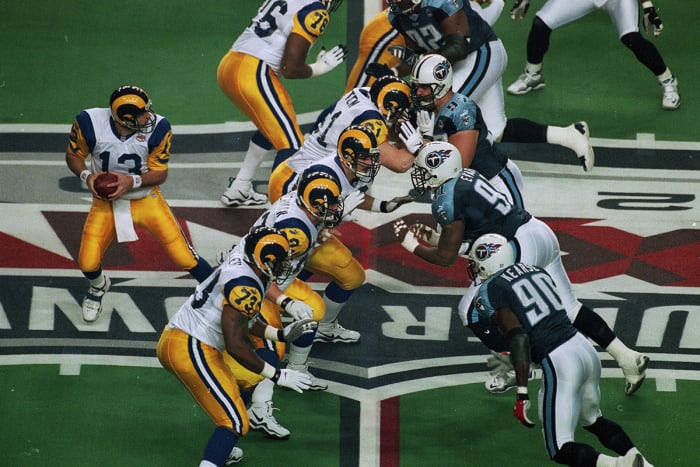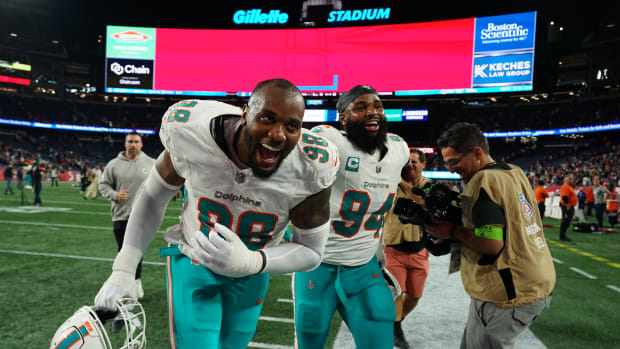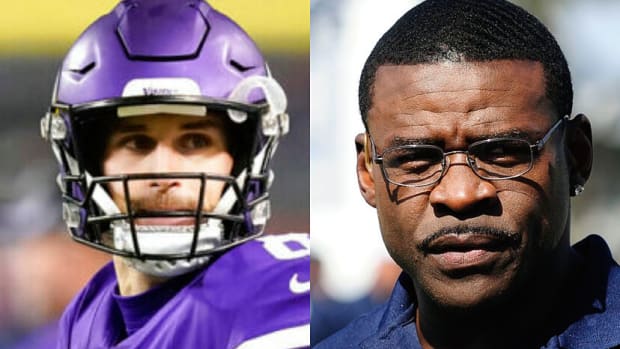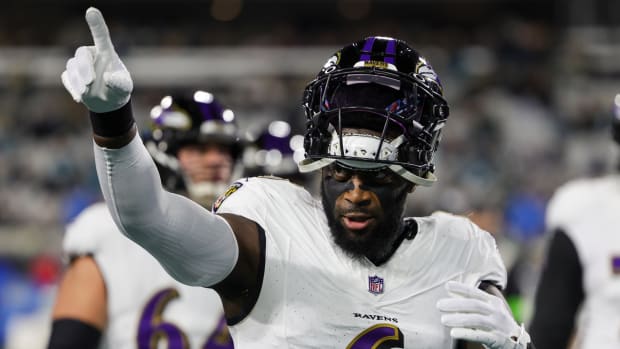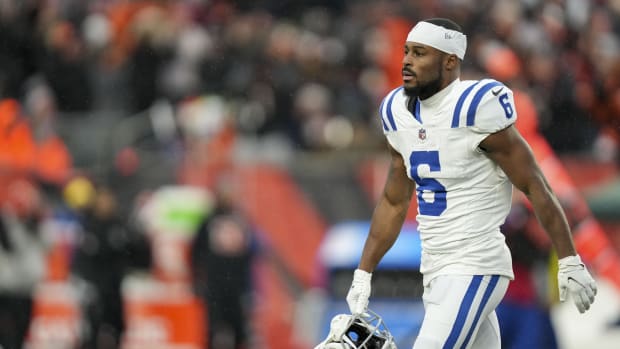When Atlanta Last Hosted a Super Bowl...
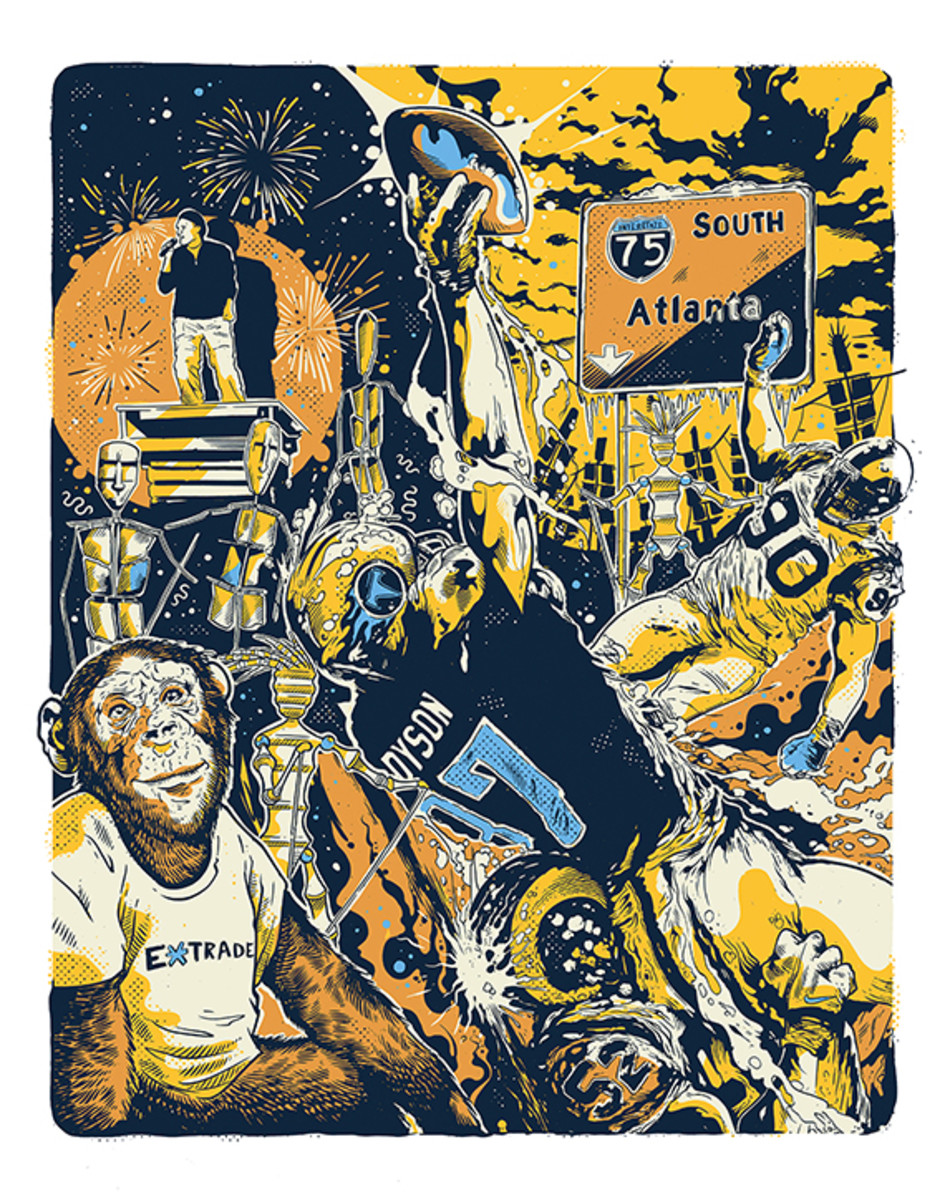
This story appears in the Jan. 28, 2019, issue of Sports Illustrated. For more great storytelling and in-depth analysis, subscribe to the magazine—and get up to 94% off the cover price. Click here for more.
On Feb. 3 the Super Bowl returns to Atlanta for the first time in 19 years. The last go-round? Well. The Rams and the Titans clashed in what would be one of the most thrilling championship games ever—but the event is remembered for other reasons. Two historic ice storms racked the region in the lead-up. And the Monday-after watercooler talk centered on the over-the-top dot-com commercials and the overnight arrest of one of the league’s biggest stars. As the city prepares to rewrite its hosting history, we look back at the last Big Game in the ATL.
I. THE BID
Go back four years before the game, to Oct. 31, 1996. All 30 NFL owners gathered in a New Orleans ballroom and voted anonymously on which city would host Super Bowl XXXIV, in January 2000.
JIM STEEG (NFL executive director of special events, 1979 to 2005): Atlanta was up for the bid against Tampa Bay. Commissioner [Paul] Tagliabue had, in effect, promised Tampa: If you build a new stadium, we’ll play a Super Bowl there.
RICH MCKAY (Buccaneers GM, 1995 to 2003; current Falcons CEO): We had gotten the vote to build [Raymond James Stadium], done our politicking and kind of knew the votes.
STEEG: The Glazer family [which still owns the team] thought pretty strongly the game was theirs.
MCKAY: Then Atlanta made its case: Rankin Smith was ill.
STEEG: Taylor Smith made the argument, “My father is dying, why don’t you give this game to him as a reward for being a loyal [owner] for 30 years.” The vote came down and the game was awarded to Atlanta. (Rankin Smith died a year later, at 72.)
MCKAY: [Malcolm] Glazer did not take that well.
STEEG: The Glazers literally went crazy.
MCKAY: Tagliabue, who was always the smartest guy in the room, figured a way to save a bad situation. He asked if we’d be willing to have the next Super Bowl vote right then.
STEEG: So we awarded two games that day. Tampa got 2001 as a consolation. And Atlanta would host in 2000.
II. THE BUILDUP
Fast-forward four years. The 1999 season kicked off on Sept. 12. Neither the Rams nor the Titans were seen as contenders. In the NFC, St. Louis was coming off a 4–12 campaign, but for years its front office had been hoarding offensive talent, culminating in ’99 with the first-round selection of N.C. State receiver Torry Holt and the fortuitous signing of Arena League QB Kurt Warner. The Rams added to that mix offensive coordinator Mike Martz, who would create a scheme unlike any the league has ever seen.
MIKE JONES (Rams linebacker, 1997 to 2000): We were the worst team in the NFL the year before that. We couldn’t find a way to win.
HOLT (Rams receiver, 1999 to 2008): When they drafted me, I was like, “I don’t want to go to this s----- team.” But then I got there and saw all the talent and . . . Oh, my God.
JONES: First it was the trade for [running back] Marshall Faulk [from the Colts, in April]. Then the Kurt Warner story.
ISAAC BRUCE (Rams receiver, 1994 to 2007): And Mike Martz.
MARTZ (Rams offensive coordinator, 1999): I was in Washington with Norv Turner [in ’97 and ’98] and he made a comment in a meeting that we had such good third-down plays, and we didn’t often get to use them. We kind of laughed. Then I went to the Rams . . . .
DICK VERMEIL (Rams coach, 1997 to ’99): When I brought Mike here, I told him the offense would be his baby. Neither he nor I anticipated it’d be as explosive as it was.
MCKAY: They suffered the injury at the end of the preseason to their starting quarterback [Trent Green], and now here comes Warner . . . .
WARNER (Rams QB, 1998 to 2003): My first thought was: This system is perfect for me.
HOLT: I remember looking at the pages of plays and how vertical everything was in the passing game.
WARNER: We were going to throw it down the field, and we were going to try to score on every play.
BRUCE: I like to compare it to when Muhammad Ali first came on the scene.
WARNER: A lot of people didn’t believe we would be able to sustain that.
MARTZ: It was the antithesis of the way the game was being played at the time. We said, “If you can cover everybody, God bless you. But I bet you can’t.”
WARNER: It was the perfect storm. We had a collection of talent that was ridiculous.
HOLT: We were pretty damn good, man. We were the Greatest Show on Turf.
The old Oilers had rebranded and relocated to Tennessee. After two 8–8 seasons in two temporary homes, their first year at Nashville’s Adelphia Coliseum, in 1999, was spectacular, with a star quarterback-running back tandem and a tenacious D.
AL DEL GRECO (Oilers/Titans kicker, 1991 to 2000): When I got to the Oilers we were a pretty good team. It went downhill when [QB] Warren Moon left, in ’93.
BRUCE MATTHEWS (Oilers/Titans, 1983 to 2001): [Owner Bud] Adams announced in ’95 that we’d be moving. Those next four years sucked.
DEL GRECO: The last season in Houston there was a “Save the Oilers” rally at City Hall. There were about 38 people.
MATTHEWS: We were a lame duck team. We’d had seven years in a row in the playoffs. Then, all of a sudden, there’s 17,000 fans in the [Astrodome]. Everything about the move was billed as, “Wait till ’97! We’ll play in Memphis the first year, but they’ll embrace us!” That wasn’t the case at all.
EDDIE GEORGE (Oilers/Titans running back, 1996 to 2003): We couldn’t give away tickets in Memphis. Playing in front of 16,000 fans, the majority cheering for the opposing team . . . . It wasn’t conducive to winning.
MATTHEWS: The ’98 season they said, “We’ll play at Vanderbilt Stadium [in Nashville]—then we’ll really start experiencing what it’s all about!” That sucked as well.
KEVIN DYSON (Oilers/Titans receiver, 1998 to 2002): [In ’99] we move again, finally, to Nashville. But now it’s, What’s our name going to be? What are our colors going to be? When they finally made that announcement, it was a special moment. We knew who we were.
MATTHEWS: There was newfound optimism. New uniform, new name, new stadium . . .
DYSON: Now we are home.
DEL GRECO: We’d been building, adding bits and pieces. Eddie George. Steve McNair was coming into his own.
GEORGE: The key piece was finding a dynamic pass rusher, a game changer on the defensive side. We drafted Jevon [Kearse in ’99], and Day One he made his presence felt as the freak of nature he was.
DYSON: He changed our team. We were championship-caliber.
The Titans went 13–3 and entered the playoffs as the AFC’s No. 4 seed.
JEFF FISHER (Oilers/Titans coach, 1995 to 2010): We were built well. We were built physically. It wasn’t a fluke that we got there.
GEORGE: Most teams weren’t built the way we were, hadn’t gone through what we had. We were mentally, physically and emotionally tough.
MATTHEWS: And we beat the Rams earlier in the year. We matched up well with them. We really felt like, “This is going to happen.”
GEORGE: [Going into SB XXXIV], everyone was giving it to the Rams. It’s going to be a blowout; it’s not worth watching. We embraced that.
St. Louis also went 13–3, breaking records with an offense that changed how football is played and earning the NFC’s No. 1 seed.
MARTZ: We had been [6–0] when we played the Titans earlier that year, and they beat us 24–21. They had us down 21–0 at half.
JONES: After that first game we knew that if we got them on a neutral site we could beat them.
DEXTER MCCLEON (Rams cornerback, 1997 to 2002): It was definitely revenge.
HOLT: We wanted to get that ass back.
III. THE STORM
A destructive ice storm—hundreds of car wrecks, including one 47-car pile-up; $48 million in damage—was certainly not the way the NFL wanted to usher in its biggest event, but that’s what it got in Atlanta one week before the game. Locals called it a 100-Year Storm—and then, two days before kickoff, a second one hit.
FISHER: The Super Bowl fell immediately after the conference championship games. One week. That made everything more difficult.
MCCLEON: When we got there, there was ice all over Atlanta.
MARTZ: It was hanging from the trees.
DAVID RATCLIFFE (Georgia Power CEO, 1993 to 2003): It was one of the worst ice storms we ever had. We had 350,000 to 400,000 people out of service.
STEEG: Those were the days before practice bubbles. The Titans were at Georgia Tech, the Rams were at the Falcons’ practice facility. Both were outside.
TODD HEWITT (Rams equipment manager, 1986 to 2001): We planned like it was Green Bay in late December. All the players had thermals. Coaches had gloves, stocking caps; everyone had hand warmers.
HOLT: It was still cold as all get-out.
GEORGE: It felt like we were practicing on sheets of ice.
HEWITT: I ordered blowers. The sidelines looked like a street corner, a bunch of guys huddling by the heater.
BRUCE: If you were looking for Isaac Bruce, I was right next to the heater.
STEEG: And there wasn’t enough room in the hotels. We had to put a tent in the parking lot for [Titans] press conferences.
FISHER: Players didn’t want to go in there for interviews, it was so cold. And cold in the South is different—it’s a wet, bone-chilling cold.
STEEG: It was so cold the orange juice we put out for everybody literally froze.
MCCLEON: Everything was ice. All the roads were frozen. The buses couldn’t move.
STEEG: But by midweek we were thinking, O.K., we’ve blown through this and we don’t have to worry about it anymore.
RATCLIFFE: Then the second storm comes. It was like, Can we get a break here?
HEWITT: On Saturday we didn’t even go to the stadium for practice, because of the weather. We had a walk-through at our hotel.
MARTZ: Cars slid off the road. It was a nightmare. It created havoc.
STEEG: You know when Hartsfield Airport closes down it’s reached a really serious point.
VERMEIL: I had family members that almost didn’t get there. It was a disaster.
STEEG: The NFL had its big party scheduled for Saturday night. Three or four thousand people. They canceled it because nobody could get to it.
HEWITT: We ended up taking our kids to Hooters instead.
BRUCE: Still, I don’t think the weather dampened the whole mood. We knew on Sunday we were playing in the Georgia Dome.
MCCLEON: Guys were so excited. We could have been playing in Alaska.
GEORGE: There could have been a tsunami and I wouldn’t have noticed. We were in the damn Super Bowl.
IV. THE BROADCAST
It was the start of a new millennium—no, the world did not end on Jan. 1, 2000—and American industry was embracing the digital revolution. Riding this wave, a whopping 25 (mostly unknown) Internet companies paid exorbitant fees to purchase 30-second ads to air during what would come to be known as the Dot-com Bowl.
MIKE ZAPOLIN (Tech entrepreneur): This was the year that made the commercials part of what the Super Bowl is.
STEVE JOHNSON (Chicago Tribune TV critic): Through the ’90s this was building as a cultural phenomenon, but that 2000 game really cemented the feeling.
ROBERT LACHKY (Anheuser Busch CMO): We had become known as the ultimate advertiser in the Super Bowl. Ten years in a row of dominance. Then, all of a sudden, the buzz was the dot-coms.
ZAPOLIN: The frenzy of investment [in dot-coms] was overwhelming. You’d go to your dentist and your dentist was like, “Oh, yeah, I have a startup fund. I have an incubator.”
GEORGE: I was getting approached by entrepreneurs. Everybody had a dot-com . Somebody knew somebody that had an uncle . . . .
JOHNSON: People were throwing billions of dollars around, right and left. And all of that led to this ridiculous onslaught of ads. That and the phenomenal success of a really great Monster.com commercial the year before.
ZAPOLIN: Monster.com had a successful Super Bowl ad, and now they had a billion-dollar market cap. I owned Computers.com and I said, “Wouldn’t it be amazing to do a Super Bowl ad to launch this thing?” . . . . We approached ABC. They said, “We can sell you one of Pepsi’s ad spots, but you have to pay $2.75 million.”
STEEG: The ad rates went up dramatically that year, to [an average of] $2.2 million, a new high.
ZAPOLIN: It was an arms race. But the commercials had to be crazy.
JOHNSON: They were all determinedly wacky.
ZAPOLIN: Cyberian Outpost had an ad where they shot gerbils out of a cannon. It was insane.
JOHNSON: The E-Trade ad was two guys and a dancing chimp. Onscreen it said, “Well, we just wasted $2,000,000.” Basically you had the sense that a bunch of companies were just spending all their venture-capital money on this one shot. And in many cases blowing it spectacularly.
JONATHAN BEAMER (Monster.com CMO): For a lot of these companies, the world wasn’t quite yet ready for them.
ZAPOLIN: Only a few months after the game, the bubble burst. All the funding stopped. Then it all crashed.
MCKAY: Within four years, half of those companies didn’t exist.
HOLT: But it’s still so fitting that the Internet was the new wave, revolutionizing the world. And the Greatest Show on Turf was a new wave. We were creative, we were innovative. We were the Internet of football.
V. THE GAME
Despite the ice storm (and a bomb threat that came about 45 minutes before kickoff), the game went on. Faith Hill belted out the national anthem and at 6:25 EST, on Jan. 30, 2000, the Titans kicked off to begin Super Bowl XXXIV.
MCCLEON: Our game plan was to stop Eddie George and keep Steve McNair in the pocket.
JONES: Eddie was the center of their offense. He set everything up.
HOLT: I had never seen a running back that big [6’ 3” and 235 pounds]. I was enamored and in awe of his size.
MCCLEON: And Steve was like an extra running back. Even if you got your hands on him, he could shake you. The Titans were dangerous in many ways.
MATTHEWS: We struggled early. Offensively, we weren’t playing very well in the first half.
GEORGE: We got out of our element. We were wide-eyed and got away from our game plan.
FISHER: We got caught up in the Greatest Show on Turf and tried to throw the ball all over the yard. We were not about that.
GEORGE: It was like we were playing in quicksand. But [the Rams] weren’t scoring either.
HOLT: We were moving the ball up and down the field, but we had problems in the red zone.
MATTHEWS: We were very thankful our defense held them to field goals.
DYSON: It gave us a fighting chance.
BRUCE: I don’t think the Titans had a Hall of Famer on that defense, but they played so well together.
MARTZ: Their whole deal was pressure. It seemed like they blitzed on every snap.
HOLT: They had Kearse. The Freak, man. The Freak.
MARTZ: He was going nuts. Nobody could block him
VERMEIL: They were knocking Kurt down. He got whacked.
HOLT: He took a beating. You could hit a quarterback back then. And they were hitting the quarterback.
MCCLEON: We led 9–0 at halftime, played about as well as we could on defense. But you knew those guys were going to get it right at half.
BRUCE: Field goals weren’t going to beat this team. Not the Tennessee Titans, led by Steve McNair. It just wasn’t going to happen.
But first, the halftime show: Phil Collins! Toni Braxton! Christina Aguilera and Enrique Iglesias! Giant puppets! And fireworks!
STEEG: The halftime show was important in history because ABC broadcast the game, and Disney had just bought ABC. Now, for halftime, you basically got the production company of the network broadcasting the game. That begot CBS two years later wanting [its Viacom partner] MTV to do the halftime show for their Super Bowl, which a couple years later begot MTV doing the Janet Jackson show.
BRUCE: Walking back on the field, the smoke from the halftime show settled right at the top of the dome. It had no exit.
HEWITT: It looked like we were in a fog bowl, or like there was a fire.
MCCLEON: Our offense took it right down the field to start the second half. You couldn’t ask for a better start: 16-0. We thought we had the game in hand.
HOLT: We got the rhythm now. Here comes the Greatest Show on Turf.
JONES: When we got up on teams, they usually didn’t come back.
BRUCE: But the Titans had different plans, man.
GEORGE: They felt like they’d won the game. Jeff Fisher said, “They’re celebrating. What are you going to do about it?”
DYSON: We looked over at the Rams celebrating and it was like, Let’s calm down and do what we do. If we go out doing what we do, we can live with that.
VERMEIL: They just started pounding it. They were patient. They didn’t play as if they were behind 16–0.
MATTHEWS: We went back to what had gotten us to that point.
DYSON: Hand the ball to Eddie George left. Hand the ball to Eddie George right. And let Steve McNair make some plays. We beat them down and wore them out.
HOLT: Eddie had two physical touchdown runs to bring them back. More powerful, physical runs that I had seen in quite some time.
JONES: Before we know it, we look up and a 16–0 game is now tied 16–16.
GEORGE: The possibility of us pulling off this magical season was within our grasp. We felt like we were destined to win.
MCCLEON: They had the momentum at that point. Martz was thinking, We need to do something to get it back real fast.
MARTZ: With two minutes and 12 seconds left, we thought we’d take a shot.
VERMEIL: I said, “Mike, this corner is about five and a half yards off Isaac Bruce and they are playing one-on-one. He can’t cover Isaac Bruce one-on-one.” And Mike called the play.
BRUCE:Twins Right, Ace Right, 999 H Balloon. I knew immediately I was getting the football.
HOLT: It was an All Go.
BRUCE: Four receivers spread out, they all run down the field, try to take the top off the defense. And I had a free release.
HOLT: Kearse was closing on Kurt. Kearse hit him and took a little bit of juice off the ball.
GEORGE: He came within an inch.
MCCLEON: But Kurt just took a chance.
BRUCE: After that it was me and the defensive back running stride for stride . . . then the ball dropped out of the sky, into my hands [for a 73-yard catch].
VERMEIL: Bang. Touchdown. But we scored [to make it 23–16] too fast.
GEORGE: We looked at the clock and said, “Oh, we got plenty of time.”
MATTHEWS: There was no doubt we were going to drive down and take this thing to overtime.
BRUCE: One minute and 48 seconds left, and we’re playing Steve McNair? Oh my goodness. Here we go.
DYSON: We started on our own 11.
GEORGE: And that’s when 9 went to work.
FISHER: It was a drive for the ages, what Steve was able to do.
BRUCE: I think a legend was introduced to America on that drive.
HOLT: I’m seeing him move the ball. I’m in awe. It was beautiful to sit there and watch him show his mastery of the position.
MCCCLEON: We were looking at that clock like, Please run! We went like 30 straight plays against Steve. That was one of the toughest things I’ve ever been through on the football field.
BRUCE: I didn’t want to see him succeed, but I felt helpless at that moment, watching his greatness.
MCCLEON: We got them to third down [with 22 seconds left]. Steve was scrambling around; it looked like we had him bottled up a couple times.
VERMEIL: [Defensive end] Kevin Carter had him in his grasp and was spinning him around.
JONES: Then Steve takes off. He whirls around.
BRUCE: He had two defensive linemen—about 600 pounds—hanging on him.
HOLT: Two of our biggest guys, he’s shedding them off.
BRUCE: It’s a true example of what we call “country strong.”
DYSON: Steve extended the play and I found a crease in the zone, and he delivered. I caught it [at the 10] to set up the final play.
HOLT: That’s when I was like, S---.
DEL GRECO: This stuff doesn’t happen unless we are supposed to win.
MCCLEON: They called a timeout with six seconds left. Time for one play.
BRUCE: I was getting my mind right to play the first overtime game in Super Bowl history.
GEORGE: If it went into overtime? They didn’t have a chance. They were exhausted.
VERMEIL: We were worn down from chasing McNair, tackling Eddie George.
HOLT: That’s what Super Bowl moments are all about. The two best teams in the National Football League going one on one against each other and it all comes down to one moment, one play.
GEORGE: The play that everybody remembers.
MCCLEON: We had a combo call [on defense]. 77 Blast. Cover 7 on both sides
DYSON: When I saw they were in zone, I knew the ball was coming to my side.
JONES: I [was covering] the inside. So as I’m running with [tight end Frank] Wycheck I’m looking at Kevin Dyson the entire time.
DYSON: Frank was pushing vertical, extending Mike. I’m coming underneath Frank to force that linebacker to make a choice.
JONES: Kevin comes underneath. I see him plant his foot in the ground to come back for the ball, and I come with him. I don’t think he sees me. I think, I’m going to kill Kevin.
DYSON: I saw him, but I didn’t think he was in position to make a tackle. I thought I could run through his arms into the end zone.
JONES: He catches it, and when I wrap him up I have my arm around his right hip. He tries to extend.
DYSON: I remember seeing the yellow paint of the end zone and thinking I had it.
JONES: Then I bring my left arm around and I catch his knee right as he’s going up. He falls like a tree because he can’t keep his balance.
DYSON: As I’m going down, I do that one last extension. If I could just get the nose of the ball across. . . . Then I see the blue and gold confetti coming down.
DEL GRECO: They call that The Tackle, I guess.
HOLT: Talk about moments. Mike Jones had his moment.
LACHKY: Mike Jones, God bless his soul.
HOLT: I want to hug him now.
GEORGE: I recall looking up at the clock to see if there was more time left. It can’t end like this.
DEL GRECO: There has to be more time.
MATTHEWS: To this day when I watch it, I’m thinking we’re going to find a way to win this thing.
DEL GRECO: You wonder what that party would have been like if we won.
HOLT: We partied like s--- in the locker room. I ended up going to different parties in Atlanta that night. Next thing I remember, I was on top of a truck, bobbing and weaving in St. Louis.
VI. THE MURDER
At approximately 4 a.m. outside one of those parties—in Buckhead, seven miles north of Georgia Dome—two men died in a stabbing incident. Ravens linebacker Ray Lewis, in town for the festivities, was arrested and charged with double murder. The news broke Monday morning.
MCCLEON: That was supposed to be the time we wake up as Super Bowl champs and it’s all about us on the news: the Miracle Rams. But the talk that morning was all about what happened in Buckhead.
FISHER: We made it back to Nashville on Monday, and all the headlines were about Ray Lewis.
GEORGE: We didn’t know if he did it, didn’t do it. We just knew two people were dead and they were accusing Ray of doing it.
HEWITT: Players were talking about it on the plane home [Monday], as we were getting ready to take off. Did you hear what happened? Where was it? It was right here!?
DYSON: I was actually at that same party. I left just before the incident and went to another party. It was surreal.
STEEG: I got a call Monday from the police telling us [Lewis] was under arrest. I had to go tell Tagliabue. He was at a chef’s table at the Hyatt. I got him, and I remember going back up the elevator trying to explain what little I knew: There was a murder investigation and Lewis was in the middle of it.
GEORGE: To wrap your head around him being involved in a situation like that was mind-boggling.
MATTHEWS: All I know is, I wanted him suspended for the next year’s playoffs. [He wasn’t.] Instead they beat us. The Ravens’ defense was just nuts.
STEEG: You go from Ray Lewis being arrested to, a year later, he was named MVP of [Super Bowl XXXV].
GEORGE: Certainly, it was a strange time.
Lewis ultimately pleaded guilty to obstruction of justice but was cleared of charges. He settled with the families of both victims.
From the SI Vault: Kurt Warner Was His Usual Stellar Self as the Rams Hung on to Beat the Titans in the Best Super Bowl Ever
VII. THE RETURN
After two decades of unprecedented growth and the opening of the state-of-the-art Mercedes-Benz Stadium, in 2017, Atlanta will host another Super Bowl. This time, city and league officials believe they’ll get it right. (Oh, and Tampa? The city is hosting again in 2021.)
GEORGE: I’ve heard people say Atlanta should never host another Super Bowl.
MCKAY: When I went to work for the Falcons [in 2003, as GM] we tried to make a bid for the Super Bowl in ’07. We were pretty confident we had a good bid. I think weather played a big part in us not getting that. [That game went to Miami.]
RATCLIFFE: All of us are hoping [a storm] doesn’t happen again. This is a huge opportunity for Atlanta to demonstrate the progress we made from 2000.
STEVE CANNON (CEO of AMB Group, which owns the Falcons): It’s interesting, when you look at that 19-year span, how Atlanta has developed as a city.
MCKAY: It’s a completely different Atlanta.
CANNON: In 2000, this wasn’t considered one of the most significant cities in America. It is now.
MCKAY: We as a city have really done a very good job in hosting a lot of big events over the last 30 years. There is one event that didn’t come off perfectly and that was the Super Bowl. We want to change that perception.
HEWITT: Now you just have to pray that the weather doesn’t drop.
MCKAY: If it happens, we are prepared for it. We spent a lot of time with the weather plan. The city is so much better suited to deal with inclement weather. We don’t want to host just this Super Bowl. We want to host Super Bowls. We want people to say: “This is as good a place to host a Super Bowl as any other place in the country.”
SCOTT JENKINS (Mercedes-Benz Stadium GM): If the weather cooperates, we are going to set the standard for what the Super Bowl is.
MCKAY: Bring a pair of shorts.
Question or comment? Email us at talkback@themmqb.com.



































